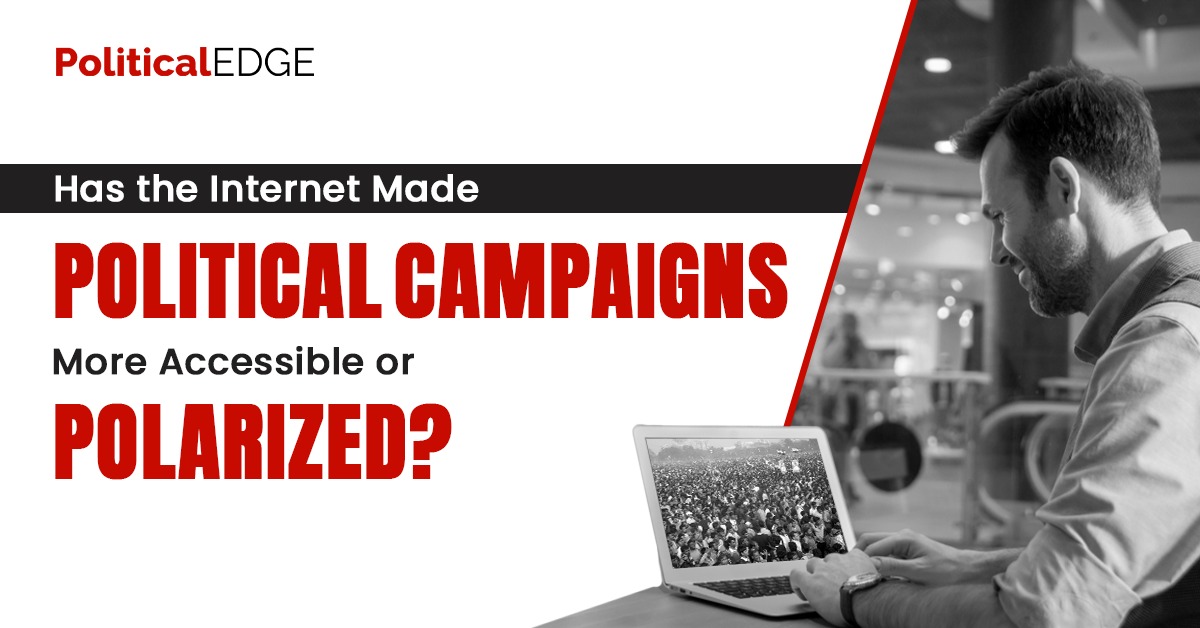
Has the Internet Made Political Campaigns More Accessible or Polarized?
The internet has become an omnipresent thing shaping various aspects of our lives, including politics. One of its significant influences is on political campaigns, raising questions about whether it has made them more accessible or further polarized. This blog explores the dual nature of the internet’s impact on political campaigns, analyzing how it both enhances accessibility and exacerbates polarization in the political landscape.
Internet and Political Campaigns
The intersection of political campaigns and the internet has profoundly reshaped the landscape of contemporary politics. On one hand, the internet has undeniably increased accessibility to political information. Social media platforms, candidate websites, and online news outlets empower voters to easily access a plethora of information about candidates’ policies and positions.
However, this accessibility comes with its own set of challenges. The rise of misinformation and fake news on digital platforms poses a threat to the accuracy of political information. The rapid dissemination of biased or inaccurate content can distort public perceptions, potentially undermining the democratic process.
Striking a balance between accessibility, accuracy, and inclusivity is essential for harnessing the positive potential of the Internet in political campaigns while addressing the pitfalls that may undermine the democratic ideals it seeks to support.
How Does the Internet Affect Political Campaigns?
The internet significantly influences political campaigns by providing unprecedented access to information, enabling candidates to engage directly with voters through social media, and fostering a more participatory political discourse in the following manner:
Accessibility through Information Dissemination
One of the undeniable benefits of the internet in political campaigns is its role in disseminating information. Social media platforms, online news outlets, and candidate websites offer unprecedented access to political information. Voters can easily navigate through a wealth of data about candidates’ stances, policies, and track records, empowering them to make informed decisions. This increased transparency and accessibility to information have arguably strengthened democratic processes, allowing voters to engage more actively in the political arena.
However, the flip side of this accessibility is the challenge of information accuracy and reliability. The rise of fake news, misinformation, and echo chambers on social media platforms has created an environment where individuals can be easily swayed by biased or inaccurate information. This has the potential to undermine the democratic process by distorting voters’ perceptions and fostering polarization.
Enhanced Engagement and Participation
The Internet has also played a crucial role in fostering citizen engagement and participation in political campaigns. Social media platforms provide a space for political discourse, enabling candidates to connect directly with voters and vice versa. Online forums, live streams, and interactive content facilitate a more dynamic and inclusive political dialogue. This has the potential to break down traditional barriers and make political campaigns more accessible to a wider audience.
On the other hand, the internet’s participatory nature can lead to the formation of online echo chambers, where individuals surround themselves with like-minded people, reinforcing their existing beliefs. This selective exposure to information can contribute to the polarization of political views, as individuals become less exposed to diverse perspectives and more entrenched in their ideological bubbles.
Polarization and Filter Bubbles
The internet’s role in political campaigns is not without its pitfalls, and one of the most significant challenges is the emergence of filter bubbles. Algorithms used by social media platforms and search engines tailor content to users’ preferences, creating echo chambers that reinforce pre-existing beliefs. This selective exposure to information contributes to the polarization of political views, as individuals are less likely to encounter diverse perspectives.
Moreover, the ease with which misinformation spreads online can further deepen political divides. False narratives, conspiracy theories, and inflammatory content can rapidly gain traction, contributing to a climate of distrust and hatred. This polarization is not limited to online spaces but spills over into real-world political discourse, making compromise and constructive dialogue more challenging.
Conclusion
In conclusion, the internet’s impact on political campaigns is a complex interplay of enhanced accessibility and increased polarization. While it has democratized information and facilitated greater citizen engagement, the prevalence of misinformation and filter bubbles poses significant challenges. Striking a balance between accessibility and accountability is essential for harnessing the positive aspects of the Internet while mitigating its potential to exacerbate political polarization. As we navigate the evolving landscape of digital politics, a thoughtful and critical approach is crucial to preserving the democratic ideals that underpin our political systems.

